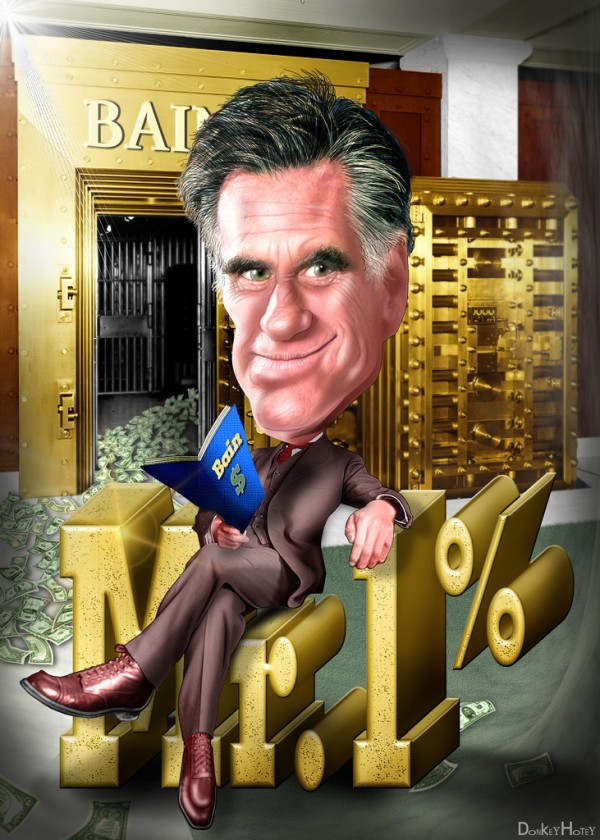Artwork by DONKEYHOTEY
GAWKER: Mitt Romney’s $250 million fortune is largely a black hole: Aside from the meager and vague disclosures he has filed under federal and Massachusetts laws, and the two years of partial tax returns (one filed and another provisional) he has released, there is almost no data on precisely what his vast holdings consist of, or what vehicles he has used to escape taxes on his income. Gawker has obtained a massive cache of confidential financial documents that shed a great deal of light on those finances, and on the tax-dodging tricks available to the hyper-rich that he has used to keep his effective tax rate at roughly 13% over the last decade. Today, we are publishing more than 950 pages of internal audits, financial statements, and private investor letters for 21 cryptically named entities in which Romney had invested—at minimum—more than $10 million as of 2011 (that number is based on the low end of ranges he has disclosed—the true number is almost certainly significantly higher). Almost all of them are affiliated with Bain Capital, the secretive private equity  firm Romney co-founded in 1984 and ran until his departure in 1999 (or 2002, depending on whom you ask). Many of them are offshore funds based in the Cayman Islands. Together, they reveal the mind-numbing, maze-like, and deeply opaque complexity with which Romney has handled his wealth, the exotic tax-avoidance schemes available only to the preposterously wealthy that benefit him, the unlikely (for a right-wing religious Mormon) places that his money has ended up, and the deeply hypocritical distance between his own criticisms of Obama’s fiscal approach and his money managers’ embrace of those same policies. MORE
firm Romney co-founded in 1984 and ran until his departure in 1999 (or 2002, depending on whom you ask). Many of them are offshore funds based in the Cayman Islands. Together, they reveal the mind-numbing, maze-like, and deeply opaque complexity with which Romney has handled his wealth, the exotic tax-avoidance schemes available only to the preposterously wealthy that benefit him, the unlikely (for a right-wing religious Mormon) places that his money has ended up, and the deeply hypocritical distance between his own criticisms of Obama’s fiscal approach and his money managers’ embrace of those same policies. MORE
SALON: Gawker’s John Cook got his hands on hundreds of pages of confidential financial documents related to Mitt Romney’s investments. They’re still going through the material — it’s obtuse stuff — but so far it’s fair to say that the trove proves that Mitt Romney is a very rich person who does weird rich people stuff with his money. In other words he has a lot of people who work very hard to make sure Romney has to pay as little in taxes as possible. Eight of the strangely named entities Romney has millions of dollars invested in are in the Cayman Islands. As Bain Capital Fund VIII LP helpfully points out: “Under the current laws of the Cayman Islands, there are no income, estate, transfer, sales, or other Cayman Islands taxes payable by the Partnership.” […] Anyway, a Fortune editor says none of this is newsworthy because it’s all just regular rich guy stuff (or private equity stuff), but the thing is, for normal people all this regular rich guy stuff is insane and scandalous. And also, sure, I totally believe that there’s “little” tax benefit to doing weird financial stuff in the Cayman Islands. I definitely buy that. Mainly, though, the takeaway from these documents is that Mitt Romney just collects millions upon millions of dollars, much of it untaxed, while sitting on his ass doing nothing to earn it, like a welfare queen. MORE
WASHINGTON POST: Post reporters and tax law specialists sifting through the documents haven’t found any bombshells yet, but the documents do appear to add a great amount of detail and context to what is known about the investment company. Our reporters  familiar with the workings of Bain say the documents will put much-needed flesh on the skeleton of what is known about the firm. In particular, the documents shed considerable light on the operation of controversial “blocker corporations” set up by Bain in tax havens like the Cayman Islands to help the investment firm delay business income taxes. Such “blockers” are not illegal but the Treasury Department has said in the past that they cost the United States millions in lost revenue every year. MORE
familiar with the workings of Bain say the documents will put much-needed flesh on the skeleton of what is known about the firm. In particular, the documents shed considerable light on the operation of controversial “blocker corporations” set up by Bain in tax havens like the Cayman Islands to help the investment firm delay business income taxes. Such “blockers” are not illegal but the Treasury Department has said in the past that they cost the United States millions in lost revenue every year. MORE
NEW YORK TIMES: Bain private equity funds in which the Romney family’s trusts are invested appear to have used an aggressive tax approach, which some tax lawyers believe is not legal, to save Bain partners more than $200 million in income taxes and more than $20 million in Medicare taxes. Annual reports for four Bain Capital funds indicate that the funds converted $1.05 billion in accumulated fees that otherwise would have been ordinary income for Bain partners into capital gains, which are taxed at a much lower rate. Although some tax experts have criticized the approach, the Internal Revenue Service is not known to have challenged any such arrangements. In a blog post Thursday, Victor Fleischer, a law professor at the University of Colorado, said that there was some disagreement among lawyers, but that he believed: “If challenged in court, Bain would lose. The Bain partners, in my opinion, misreported their income if they reported these converted fees as capital gain instead of ordinary income.” MORE
ASSOCIATED PRESS: Mitt Romney’s success in raising hundreds of millions of dollars in the costliest presidential race ever can be traced in part to a secretive data-mining project that sifts through Americans’ personal information — including their purchasing history and church attendance — to identify new and likely, wealthy donors, The Associated Press has learned. For the data-mining project, the Republican candidate has quietly employed since at least June a little-known but successful analytics firm that previously performed marketing work for a colleague tied to Bain & Co., the management-consulting firm that Romney once led.  The head of Buxton Co. of Fort Worth, Texas, chief executive Tom Buxton, confirmed to the AP his company’s efforts to help Romney identify rich and previously untapped Republican donors across the country. MORE
The head of Buxton Co. of Fort Worth, Texas, chief executive Tom Buxton, confirmed to the AP his company’s efforts to help Romney identify rich and previously untapped Republican donors across the country. MORE
HUFFINGTON POST: Massachusetts will make available to the public hundreds of boxes of documents from Republican presidential candidate Mitt Romney’s term as governor that have long been locked away, the state said Tuesday. The same agency that is opening the files said it would not pursue an inquiry into the purge of electronic records at the end of Romney’s term. The moves come after disclosures that Romney had authorized the purging of emails and other closely-held electronic records at the end of administration. The decision by the Massachusetts Secretary of the Commonwealth will ultimately make available more than 460 boxes of documents stored since 2006 in the state archives in south Boston. They were closed to public inspection because of legal uncertainty over the impact of a court ruling that said Massachusetts governor’s records were not subject to disclosure. Romney’s presidential campaign aides recently cited that decision to justify the deletion of files from Massachusetts email servers at the end of his governor’s term in 2007. Romney also allowed aides to buy and remove their government hard drives and authorized the replacement of leased computers in his executive offices. MORE

